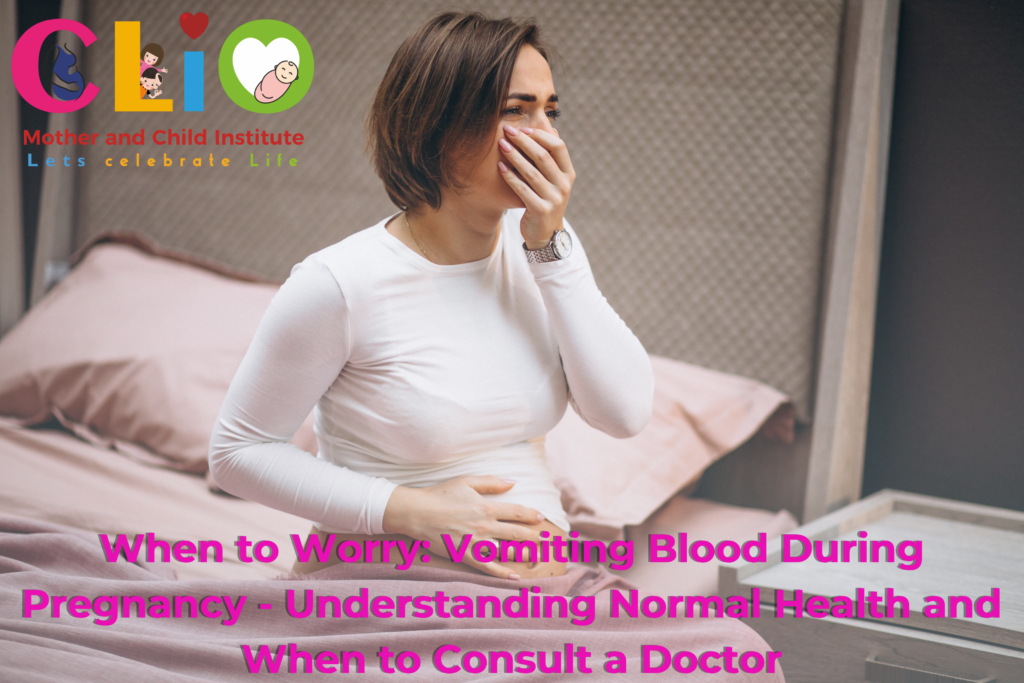Introduction
Pregnancy is a transformative period in a woman’s life, marked by a myriad of physical changes as the body nurtures and supports the growth of a new life. However, it’s not uncommon for expectant mothers to face unexpected challenges. One such alarming symptom is vomiting blood during pregnancy, which can understandably cause significant concern. In this comprehensive guide, we will delve into the potential causes, what is considered normal health during pregnancy, and most importantly, when it’s crucial to seek immediate medical attention.
Understanding Normal Health During Pregnancy
- Morning Sickness: Nausea and vomiting, commonly known as morning sickness, are normal occurrences during the first trimester. These symptoms are usually attributed to hormonal changes and are considered a natural part of pregnancy.
- Increased Blood Volume: Pregnancy leads to a substantial increase in blood volume to support the growing fetus. This surge in blood flow can sometimes put pressure on blood vessels, leading to occasional nosebleeds or, in rare cases, bleeding during vomiting.
- Gastrointestinal Changes: The hormonal fluctuations during pregnancy can affect the digestive system, leading to symptoms like heartburn and indigestion. While these are generally mild and temporary, severe issues may require medical evaluation.
- Hormonal Changes: Hormonal shifts, particularly the increase in hormones like progesterone, can relax the muscles in the gastrointestinal tract. This can lead to slower digestion and occasional reflux, which, if severe, might result in the presence of blood during vomiting.
Causes of Vomiting Blood During Pregnancy
- Gastrointestinal Issues: Pregnancy can make women more prone to conditions like gastritis or gastric ulcers due to increased hormonal levels. These issues can result in irritation and bleeding in the digestive tract.
- Esophageal Varices: Dilated blood vessels in the esophagus, known as varices, can occur during pregnancy and may rupture, causing blood to be present in vomit.
- Morning Sickness Intensity: Severe and prolonged morning sickness can lead to irritation of the esophagus, potentially causing bleeding during vomiting.
- Erosive Esophagitis: Inflammation of the esophagus due to stomach acid can result in bleeding and vomiting blood During Pregnancy.
- Increased Blood Flow: The heightened blood flow during pregnancy can contribute to the development of varicose veins in the gastrointestinal tract, increasing the risk of bleeding during vomiting.
When to Visit a Doctor
While occasional mild vomiting may be part of the normal course of pregnancy, there are certain signs and symptoms that should not be ignored. If you experience any of the following, seeking immediate medical attention is crucial:
- Persistent Vomiting: If vomiting is persistent, especially if it is severe and accompanied by the presence of blood, it is essential to consult a doctor. Persistent vomiting can lead to dehydration, posing risks to both the mother and the baby.
- Abdominal Pain: Severe abdominal pain along with vomiting blood During Pregnancy may indicate a more serious issue, such as a gastrointestinal bleed or other complications that require urgent medical attention.
- Changes in Fetal Movement: Any noticeable changes in fetal movement, including a decrease in activity, should prompt an immediate visit to the doctor. It could be indicative of fetal distress.
- Dizziness or Fainting Spells: Vomiting blood During Pregnancy, coupled with dizziness or fainting spells, could indicate a more critical condition that requires urgent medical evaluation.
- Rapid Weight Loss: Excessive vomiting, especially if accompanied by weight loss, can have detrimental effects on both maternal and fetal health. Seeking medical attention is vital to address the underlying causes and prevent complications.
Taking Action at CLIO Mother and Child Institute
When it comes to the health of you and your unborn child, seeking care from a specialized institution is of paramount importance. At CLIO Mother and Child Institute, we understand the unique challenges that pregnancy can present, and our team of experienced obstetricians and healthcare professionals is dedicated to providing comprehensive and compassionate care.
- Specialized Obstetric Care: Our institute is equipped with state-of-the-art facilities and a team of specialists focused on maternal health, ensuring that you receive the highest standard of care during your pregnancy.
- Advanced Diagnostic Tools: CLIO is equipped with advanced diagnostic tools to accurately assess and diagnose the causes of vomiting blood during pregnancy. Our commitment to technology ensures precise and timely interventions.
- Collaborative Approach: We believe in a collaborative approach to healthcare, involving open communication between our specialists and the expectant mother. Your concerns are our priorities, and together, we work towards the best possible outcome for both you and your baby.
- 24/7 Emergency Services: Understanding that emergencies can happen at any time, our institute provides 24/7 emergency services to address any concerns or complications promptly.
Conclusion
Experiencing vomiting blood during pregnancy can be distressing, but with the right care and attention, potential complications can be effectively managed. At CLIO Mother and Child Institute, we are here to support you through every step of your pregnancy journey. Whether it’s providing reassurance, conducting thorough diagnostics, or offering timely interventions, our team is dedicated to ensuring the health and well-being of both you and your precious baby. Trust CLIO for expert maternal care and a safe passage into motherhood. Remember, your well-being is our priority.


